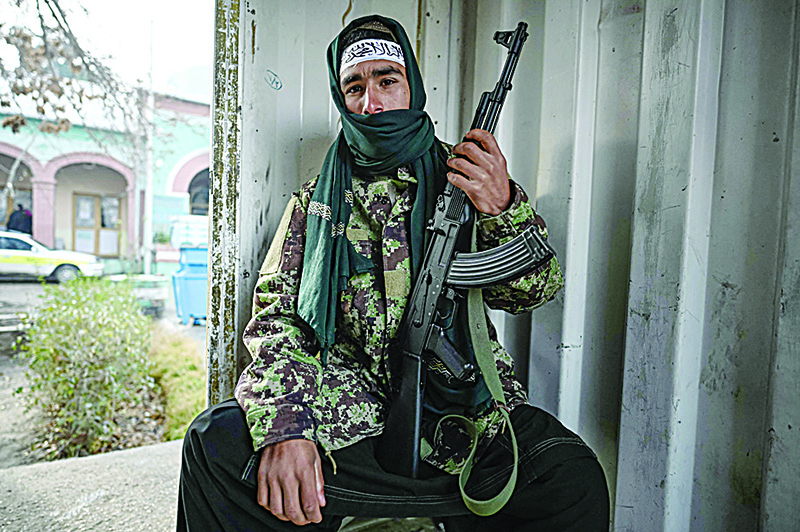 MAZAR-I-SHARIF, Balkh Province, Afghanistan: A Taleban fighter sits at a checkpoint in Mazar-i-Sharif. —AFP
MAZAR-I-SHARIF, Balkh Province, Afghanistan: A Taleban fighter sits at a checkpoint in Mazar-i-Sharif. —AFP
PARIS: Usman has been safe from the violence in his native Afghanistan ever since he fled to France seeking asylum after the Taleban took Kabul back from the retreating Americans, but what happens at home can still upend his world. The worst moment was two months ago, when the Taleban took his father. “One night, in the middle of the night, they knocked at our door and they told my father to follow them. He was put in a small room, all dark, where he was beaten,” Usman, a former government official, who asked for his real name and even that of his home town to be withheld, told AFP.
Accusing him of being an infidel, and his son of working for the US, they threatened to kill Usman’s father and take away his land and “give it to our mujahedin”, guerilla fighters. “I knew the Taleban are cruel. They could do anything,” Usman said. After three days, Afghanistan’s new rulers let their prisoner go, thanks to pleading from his family and tribal elders. “A miracle,” sighed Usman. The episode’s toll on the mental wellbeing of Usman, who came to France with his wife and children, is high. He feels “eaten up by guilt” for leaving his relatives behind, he said, and by fear about what may happen next. Both Usman and his wife take anti-depressants to cope, he said.
Usman’s brother Omar — also not his real name — said although their father seemed safe for now, other Taleban factions could decide at any time to arrest him again. Omar, who has been living in France since last year, said he “was crying all the time” during his father’s abduction and even now, “every time I wake up, I am worried that the same thing will happen again”.
Abductions for ransom, a widespread practice under the former regime in Afghanistan, have become rarer under Taleban, but the new rulers often detain, and sometimes kill, those deemed hostile to them, said Mirwais Afghan, who runs the British-based Khabarial.com website, which has confirmed Usman’s story.
‘People are scared’
The UN accuses the Taleban of having, since August, executed over 70 former Afghan army soldiers and others with ties to the former government and security forces. The Taleban reject the allegations as “rumours” and call Khabarial.com, which runs almost daily stories of killing by Taleban troops, a “propaganda” site.
“The real numbers are much higher than the ones from the UN, said Mirwais Afghan, who has counted more than 550 deaths over four months in eight of Afghanistan’s 34 provinces. Afghan, who used to work for the BBC, says he always double checks his information, which AFP was unable to verify. “Last month, one of my relatives was beheaded. We are still looking for the head. I am not releasing the story. So who will know about it ?” he said. Others also try and keep a count of the dead. Majeed Qarar, a former Afghan diplomat now living in Canada, says the “killings are really systematic”, adding that “on my Twitter account alone, you can find more than 200 killed”.
At the end of November, the Human Rights Watch NGO said there had been 100 murders or forced disappearances in just four Afghan provinces.
“In their previous Emirate, they had targeted non-mullah educated people. Now, they have restarted to cleanse the people who they see as obstacles for the future,” Qarar said.
Samira Hamidi of Amnesty International said “violence has increased, not lessened”, adding that killings often go unreported since Western media have evacuated their staff and the local press fears reprisals. “There is no more battlefield,” she said. “But there is violence everywhere” and “people are scared”.
Pashtana Durrani, founder of the LearnAfghanistan NGO, said one of her friends was killed in retaliation for saying on social media that the Taleban are incapable of ruling the country. “I am not going on social media anymore, because they make me anxious,” Durrani said. —AFP




